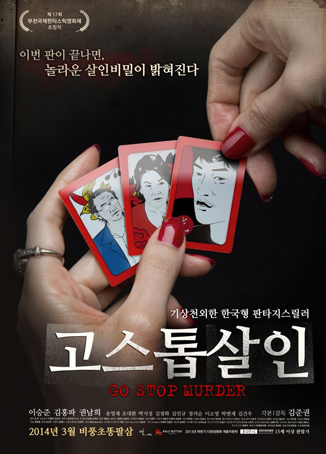"Some things need to be seen to be believed...
I don't want to kill anyone. I only want to understand how this system works, specifically and fundamentally, as a natural scientist..."
Synopsis:
Four middle-aged individuals meet every weekend without fail to gamble large amounts of money playing card game 'Go, Stop'. When one of the female members of the group drops dead while having a cigarette outside for no (initially) obvious reason, Sang-yi (Lee Seung-joon) is roped in to take her place in spite of being far younger than any of the other players and already being chased by loan sharks for unpaid gambling debts.
On losing heavily on the first day's play, Sang-yi is offered the chance by another of the group - a college professor (Kim Hong-pa) - to make money by helping him stack the card decks and force the games' outcomes, but before long it becomes obvious to Sang-yi that his 'cheating partner' isn't trying to win money at all and is instead fixing the cards in favour of one player in particular, Ms Choi (Kwon Nam-hee).
For, in each game of 'Go, Stop', the cards Ms Choi plays add up to the social security number of a real-life person - that person subsequently meeting their demise at a date and time also detailed in her cards - and as such it isn't long before it dawns on Sang-yi that he could perhaps use the 'Go, Stop' games to his own advantage by stacking the deck to specifically bring about the deaths of the brutal thugs threatening his life, rather than struggling to pay back the money he owes but cannot afford.
However, the ability to play with life and death comes with its own costs attached, demanding a price ultimately far higher than Sang-yi could ever have imagined...
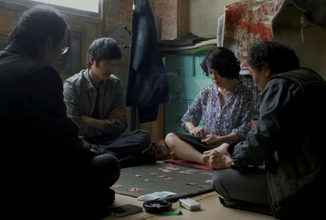 |
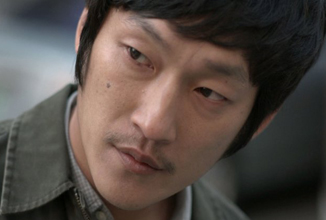 |
Review:
Since the days of the New Korean Cinema wave in the late nineties and early noughties, cinematic stories of multiple murders and serial killers have become fairly prevalent in Korean film narratives, heralded in part by 2003's sublime 'Memories of Murder' (directed by Bong Joon-ho) being based on the real-life story of Korea's first serial killings case. In 'Go, Stop, Murder', neither the Professor nor Sang-yi would ever consider themselves murderers let alone serial killers - both simply using a mystical happenstance to facilitate the handsfree fatal accomplishment of their individual needs - but each nonetheless shares physiological traits seen in archetypal murder tale characters and, as such, while 'Go, Stop, Murder' initially appears largely unrelated to standard murder and death fare it gradually shows itself to in fact be a highly original take on an often seen theme; feeling refreshingly different while retaining an, almost unconscious, familiarity with which to draw fans of classic Korean murder tales to utter immersion with ease:
Fairly early on in proceedings, the Professor claims that he has no desire to kill anyone and that he only wants to understand the way in which Ms Choi's 'Go, Stop' playing choices dictate who will die and when, and though that statement is indeed true his utter lack of feeling, caring, remorse and/or empathy for the 'innocent' victims bears an unmistakable resemblance to the psyches of killers in numerous cinematic instances.
Certainly, he remains - for the large part - at arm's length from the deaths, allowing the cards' 'magic' to do the deed, if you will, but even so he cannot be considered blameless of responsibility knowing all the while, as he does, exactly what his actions will lead to. Likewise, it could be said that the Professor has in his mind rationalised the twisted notion that these strangers must die to further his knowledge; in a way his pleasure in increasingly understanding the system of the mystic game being his gratification - a satisfaction akin to the gratification any killer gets from causing death.
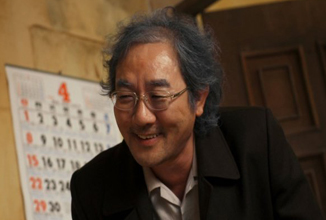 |
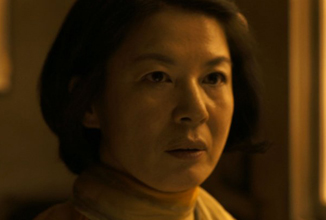 |
On the surface at least, the character of Sang-yi stands as accomplice to the Professor but from the very outset his character arc is also layered with another often seen 'classic' Korean cinema theme; that of family and the importance of familial bonds:
When we first meet Sang-yi, he is an utterly self-serving individual who has left the girl with whom he fathered a child; squandered all of his money gambling - even having had a kidney forcibly removed by loan sharks - and has neither the desire nor moral drive to have anything whatsoever to do with his offspring in spite of learning that the boy's mother has died as a result of a botched medical procedure.
However, a chance conversation with one of the individuals Sang-yi is fully prepared to kill (again with the cards) brings him face-to-face with the fact that, good or bad, each of those whose number comes up in the 'Go, Stop' games is a person with their own hopes, dreams and loves; awakening Sang-yi's own humanity in the process and underlining the idea that if he'd focused on those around and close to him rather than concentrating on himself then perhaps things would have turned out differently.
As such, for Sang-yi's individual story, he moves from being a thoughtless killer taking life he sees as less important than his own to a man fully aware that stangers and loved ones alike have their own lives and as much right to them as he has to his; the question ultimately becoming whether his realisation dawns in time for him to make amends or if it is just too little too late.
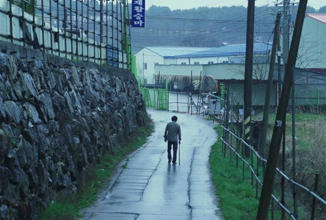 |
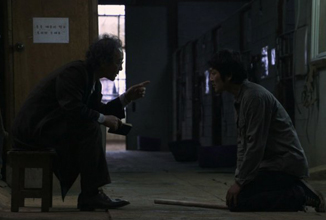 |
While the stories of Sang-yi and the Professor (both individual and combined) drive the narrative of 'Go, Stop, Murder' inextricably forward - serving as the meat, if you will, of proceedings - it is the character of Ms Choi that provides the bones and though she features to a far smaller extent than either of the other two main characters it is in her personality traits that the film truly shows its nuanced intelligence.
Aside from her card choices determining the fate of those whose numbers deem them to die, Ms Choi's decisions - from her falling for Sang-yi, changing her game play to ensure that he loses less; to her subsequent refusal to play as the result of having her advances spurned - come largely from her emotions (her humanity), ranging from unpredictable mood swings to heartbreak and embarrassment to out-and-out foot stamping tantrums, not only influencing the actions of both Sang-yi and the Professor but also singlehandedly allowing for almost the entirety of the gently (and intelligently) funny moments throughout the film; elements that add greatly to Go, Stop, Murder's already numerous strengths. To my mind, Ms Choi is not only an obviously vital character but is also the most memorable and engaging; and considering how superbly each of the main characters is detailed, that really is saying something.
Finally again on the subject of popular cinematic tropes, the conclusion of 'Go, Stop, Murder' involves a time-slip - a narrative element seen repeatedly in Korean films and even more so dramas of late - and while discussion of its specifics in this case would risk destroying its surprising nature, its appearance both gives the film a popular topicality at the same time as tying up story elements from even the earliest stages of the film; once again pointing to the intelligence with which the storyline is imbued.
Cinematically, 'Go, Stop, Murder' is clearly a low budget production but director Kim Joon-kwon deftly uses that to the film's advantage; the rundown surroundings and handheld camerawork fitting perfectly with the world the characters inhabit and the murky depths to which they're prepared to stoop for their own ends.
Music is used sparsely in 'Go, Stop, Murder', largely accompanying segueways between set pieces, but on the occasions that it does feature in a main narrative scene it beautifully morphs from a lighthearted, almost European feel, to that of a weird fairground attraction, to a twisted Western of sorts; as and when the narrative calls for playfulness, intrigue or tension building.
Cast:
Lee Seung-joon, Kim Hong-pa, Kwon Nam-hee
Summary:
'Go, Stop, Murder' gives a highly original take on classic Korean Cinema ideas and themes; feeling refreshingly different while retaining an almost unconscious familiarity. An unashamedly low budget production that deftly uses its financial limitations to greatly strengthen an already intelligently written script.
'Go, Stop, Murder' (고스톱 살인) / 2013 / directed by Kim Joon-kwon
Duration: 100 minutes (approx.)
|








